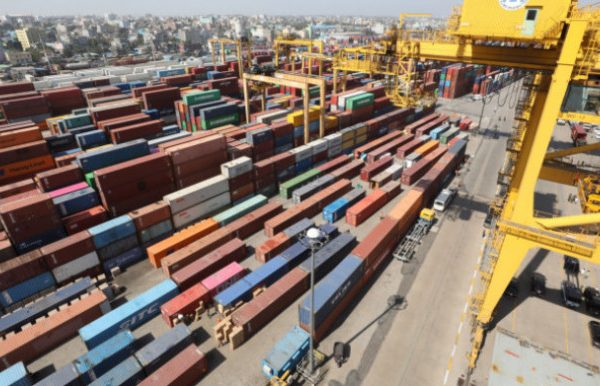15,000 export containers piled up for NBR shutdown
- Update Time : Monday, June 30, 2025

TDS Desk:
Export operations at Chattogram Port and its 19 Inland Container Depots (ICDs) have been severely disrupted due to a recent complete shutdown program by National Board of Revenue (NBR) officials, resulting in massive container congestion.
As of 8am on Monday (June 30), nearly 15,000 export containers have piled up across the ICDs, while the port yard is now holding over 41,000 containers, far exceeding its optimal capacity.
Officials estimate that it will take at least a week to restore normalcy, sources said.
SHIPS DELAYED, CONTAINERS MISSED
On 29 June, four container vessels were unable to depart Chattogram Port as scheduled due to delayed arrival of export containers from the ICDs.
These ships were collectively waiting for over 3,000 containers, including export and empty units.
By 30 June, five ships, including the previously delayed ones, eventually departed for various international destinations such as Singapore and Colombo.
However, due to continued backlogs, around 50 export containers could not be loaded in time.
Mosharaf Hossain, terminal manager of New Mooring Container Terminal (NCT) operated by Saif Powertec under Chattogram Port Authority, said that two export containers (TEUs) destined for the ship HONG DA XIN 68 and 39 TEUs for the HONG YONG CHANG SHENG were not loaded and the vessels left Chattogram Port without them.
According to information from Mediterranean Shipping Company, their container vessel AS SICILIA was unable to load 243 export containers (TEUs) and, as a result, did not depart from the GCB terminal on 29 June.
Although it eventually left Chattogram Port for Singapore this afternoon, it still could not load three TEUs of export containers, sources said.
This morning, 20 vessels were waiting at the outer anchorage to berth at Chattogram Port. Of these, 11 were gearless and nine geared, with some waiting for up to six days.
Shipping companies say daily waiting costs range from $15,000 to $20,000 per ship, adding to operational costs — which may eventually be passed on to exporters.
OVERFLOW AT ICDS
According to the Bangladesh Inland Container Depots Association (BICDA), the ICDs typically store 8,000 TEUs of export containers and send 2,000–2,200 TEUs to the port daily. But due to the shutdown that began on 25 June, the container backlog surged to 14,946 TEUs by today.
BICDA Secretary General Ruhul Amin Sikder said customs activities resumed at the ICDs on last night (29 June), and 1,817 TEUs have been transported to Chattogram Port by this morning.
He added, “It will take at least a week to clear the congestion, but efforts are being made in line with ship schedules.”
The combined container storage capacity of the 19 ICDs is 106,200 TEUs, of which 82,056 TEUs were occupied as of 30 June — 58,476 TEUs of which are empty containers.
CONGESTION AT CHATTOGRAM PORT YARD
The port yard has a holding capacity of 53,518 TEUs, though smooth operations require around 35,000 containers.
However, by on Monday 41,432 TEUs were stacked at the port, up from 37,383 TEUs on 25 June — an excess of 4,049 TEUs in just five days.
Container delivery dropped sharply during the shutdown: only 139 TEUs were released on Saturday (28 June) and 774 TEUs on Sunday.
Under normal circumstances, 4,000–4,500 TEUs are delivered daily. Over the past two days, just 913 TEUs were delivered — a fraction of the expected 8,000 TEUs.
Chattogram Port Authority Secretary Md Omar Faruk said, “The port remains open 24/7, and container delivery has normalised since on Monday. We expect the backlog to be cleared within a few days.”
CUSTOMS BACK TO WORK
After the NBR officials ended their strike last night, customs operations resumed at both the port and ICDs.
Activities such as bill of entry processing and customs assessment for import and export goods are now fully active.
Chattogram Custom House Deputy Commissioner Saidul Islam said, “We are working to quickly complete the assessment of pending import consignments and expect to clear the backlog by today.”
According to Sarwar Alam Khan, an executive member of the Chattogram C&F Agent Association, the delay has financially impacted traders. Importers are now liable to pay additional demurrage charges for delayed delivery, and storage fees increase fourfold after four days of container unloading.
“This disruption has led to significant financial losses for traders, many of whom were unable to take delivery due to the customs shutdown,” he added.


















